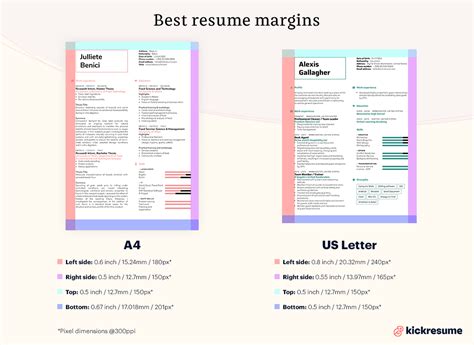Optimal Resume Margins: Expert Recommendations

As you prepare to write or update your resume, one factor that may not immediately come to mind is the importance of setting appropriate margins. Margins can affect the overall look and readability of your resume, which can in turn impact how well it is received by potential employers. In this article, we’ll explore the expert recommendations for optimal resume margins, and why they matter.
Why Are Resume Margins Important?
Before we dive into the specifics of setting optimal margins, it’s important to understand why this is even a consideration. Here are a few reasons why margins matter:
- Readability: Proper margins help ensure that your resume is easy to read and doesn’t feel cluttered or cramped. This is especially important if you’re submitting a physical copy of your resume, as small margins can make it difficult to fit all of your content on the page.
- Professionalism: A well-formatted resume conveys professionalism and attention to detail. Setting appropriate margins is just one aspect of this, but it’s an important one.
- Consistency: Using consistent margins throughout your resume helps create a cohesive look and feel, which can help you stand out to potential employers.
What Are the Optimal Resume Margins?
So, what are the specific margin measurements you should be using for your resume? Here are the expert recommendations:
1. Use 1-inch margins on all sides.
The most common margin measurement for resumes is 1 inch on all sides. This provides a balanced look and ensures that your content has enough breathing room. It also helps ensure that your resume fits neatly on a standard 8.5″ x 11″ sheet of paper.
2. Consider reducing the margins if necessary.
While 1 inch margins are a safe bet, there may be situations where you need to reduce them slightly in order to fit all of your content onto a single page. If you do need to reduce your margins, experts recommend going no lower than 0.75 inches on all sides.
3. Avoid excessively wide or narrow margins.
While it may be tempting to try to fit as much content as possible onto a single page by using narrow margins, this can actually hurt your resume’s readability and overall look. On the other hand, excessively wide margins can make your resume look unbalanced and unprofessional. Stick to the 1 inch recommendation if at all possible.
FAQs About Resume Margins
What if I’m submitting my resume online?
While physical copies of resumes are still common, many employers now request that applicants submit their resumes online. In this case, margins may be less of a concern, as the document will likely be viewed on a screen rather than printed out. However, it’s still a good idea to use balanced margins for a professional look.
Can I adjust the margin on just one side?
While it’s possible to set different margins for each side of a document, this can create an unbalanced look that may be distracting to potential employers. Stick to uniform margins on all sides for the most professional appearance.
What if I’m having trouble fitting all of my content onto one page?
If you’re struggling to fit all of your relevant experience and qualifications onto one page, it may be worth reevaluating the content you’re including. Focus on the most relevant and impressive aspects of your experience, and consider removing any information that may be redundant or less important. If you still can’t fit everything onto one page, consider adjusting your margins slightly (but not below 0.75 inches on all sides).
Conclusion
While it may seem like a small detail, setting appropriate margins can have a big impact on the overall look and readability of your resume. By following the expert recommendations for optimal resume margins, you can ensure that your resume looks professional and polished, and that it stands out to potential employers.
